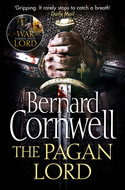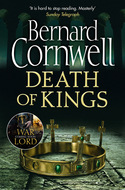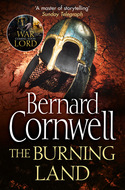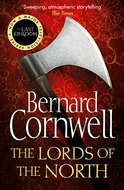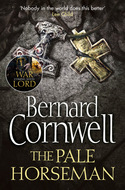Kitap dosya olarak indirilemez ancak uygulamamız üzerinden veya online olarak web sitemizden okunabilir.
Kitabı oku: «The Last Kingdom Series Books 1-6», sayfa 26
And I had other enemies in Northumbria. There was Earl Kjartan and his son Sven, who had lost an eye because of me, and they would kill me gladly, and my uncle would pay them to do it, and so I had no future in Northumbria, not then. But I would go back. That was my soul’s wish, and I would go back with Ragnar the Younger, my friend, who still lived because his ship had weathered the storm. I heard that from a priest who had listened to the negotiations outside Exanceaster and he was certain that Earl Ragnar had been one of the Danish lords in Guthrum’s delegation. ‘A big man,’ the priest told me, ‘and very loud.’ That description convinced me that Ragnar lived and my heart was glad for it, for I knew that my future lay with him, not with Alfred. When the negotiations were finished and a truce made, the Danes would doubtless leave Exanceaster and I would give my sword to Ragnar and carry it against Alfred, who hated me. And I hated him.
I told Mildrith that we would leave Defnascir and go to Ragnar, that I would be his man and that I would pursue my bloodfeud against Kjartan and against my uncle under Ragnar’s eagle banner, and Mildrith responded with tears and more tears.
I cannot bear a woman’s crying. Mildrith was hurt and she was confused and I was angry and we snarled at each other like wildcats and the rain kept falling and I raged like a beast in a cage and wished Alfred and Guthrum would finish their talking because everyone knew that Alfred would let Guthrum go, and once Guthrum left Exanceaster then I could join the Danes and I did not care whether Mildrith came or not, so long as my son, who bore my name, went with me. So by day I hunted, at night I drank and dreamed of revenge and then one evening I came home to find Father Willibald waiting in the house.
Willibald was a good man. He had been chaplain to Alfred’s fleet when I commanded those twelve ships, and he told me he was on his way back to Hamtun, but he thought I would like to know what had unfolded in the long talks between Alfred and Guthrum. ‘There is peace, lord,’ he told me, ‘thanks be to God, there is peace.’
‘Thanks be to God,’ Mildrith echoed.
I was cleaning the blood from the blade of a boar spear and said nothing. I was thinking that Ragnar was released from the siege now and I could join him.
‘The treaty was sealed with solemn oaths yesterday,’ Willibald said, ‘and so we have peace.’
‘They gave each other solemn oaths last year,’ I said sourly. Alfred and Guthrum had made peace at Werham, but Guthrum had broken the truce and murdered the hostages he had been holding. Eleven of the twelve had died, and only I had lived because Ragnar was there to protect me. ‘So what have they agreed?’ I asked.
‘The Danes are to give up all their horses,’ Willibald said, ‘and march back into Mercia.’
Good, I thought, because that was where I would go. I did not say that to Willibald, but instead sneered that Alfred was just letting them march away. ‘Why doesn’t he fight them?’ I asked.
‘Because there are too many, lord. Because too many men would die on both sides.’
‘He should kill them all.’
‘Peace is better than war,’ Willibald said.
‘Amen,’ Mildrith said.
I began sharpening the spear, stroking the whetstone down the long blade. It seemed to me that Alfred had been absurdly generous. Guthrum, after all, was the one remaining leader of any stature on the Danish side, and he had been trapped, and if I had been Alfred there would have been no terms, only a siege, and at its end the Danish power in southern England would have been broken. Instead Guthrum was to be allowed to leave Exanceaster. ‘It is the hand of God,’ Willibald said.
I looked at him. He was a few years older than I was, but always seemed younger. He was earnest, enthusiastic and kind. He had been a good chaplain to the twelve ships, though the poor man was ever seasick and blanched at the sight of blood. ‘God made the peace?’ I asked sceptically.
‘Who sent the storm that sank Guthrum’s ships?’ Willibald retorted fervently, ‘who delivered Ubba into our hands?’
‘I did,’ I said.
He ignored that. ‘We have a godly king, lord,’ he said, ‘and God rewards those that serve him faithfully. Alfred has defeated the Danes! And they see it! Guthrum can recognise divine intervention! He has been making enquiries about Christ.’
I said nothing.
‘Our king believes,’ the priest went on, ‘that Guthrum is not far from seeing the true light of Christ.’ He leaned forward and touched my knee. ‘We have fasted, lord,’ he said, ‘we have prayed, and the king believes that the Danes will be brought to Christ and when that happens there will be a permanent peace.’
He meant every word of that nonsense and, of course, it was sweet music to Mildrith’s ears. She was a good Christian and had great faith in Alfred, and if the king believed that his god would bring victory then she would believe it too. It seemed madness to me, but I said nothing as a servant brought us barley ale, bread, smoked mackerel and cheese. ‘We shall have a Christian peace,’ Willibald said, making the sign of the cross above the bread before he ate, ‘sealed by hostages.’
‘We’ve given Guthrum hostages again?’ I asked, astonished.
‘No,’ Willibald said. ‘But he has agreed to give us hostages. Including six earls!’
I stopped sharpening the spear and looked at Willibald. ‘Six earls?’
‘Including your friend, Ragnar!’ Willibald seemed pleased by this news, but I was appalled. If Ragnar was not with the Danes then I could not go to them. He was my friend and his enemies were my enemies, but without Ragnar to protect me I would be horribly vulnerable to Kjartan and Sven, the father and son who had murdered Ragnar’s father and who wanted me dead. Without Ragnar, I knew, I could not leave Wessex.
‘Ragnar’s one of the hostages?’ I asked. ‘You’re sure?’
‘Of course I’m sure. He will be held by Ealdorman Wulfhere. All the hostages are to be held by Wulfhere.’
‘For how long?’
‘For as long as Alfred wishes, or until Guthrum is baptised. And Guthrum has agreed that our priests can talk to his men.’ Willibald gave me a pleading look. ‘We must have faith in God,’ he said. ‘We must give God time to work on the hearts of the Danes. Guthrum understands now that our god has power!’
I stood and went to the door, pulling aside the leather curtain and staring down at the wide sea-reach of the Uisc. I was sick at heart. I hated Alfred, did not want to be in Wessex, but now it seemed I was doomed to stay there. ‘And what do I do?’ I asked.
‘The king will forgive you, lord,’ Willibald said nervously.
‘Forgive me?’ I turned on him. ‘And what does the king believe happened at Cynuit? You were there, father,’ I said, ‘so did you tell him?’
‘I told him.’
‘And?’
‘He knows you are a brave warrior, lord,’ Willibald said, ‘and that your sword is an asset to Wessex. He will receive you again, I’m sure, and he will receive you joyfully. Go to church, pay your debts and show that you are a good man of Wessex.’
‘I’m not a West Saxon,’ I snarled at him, ‘I’m a Northumbrian!’
And that was part of the problem. I was an outsider. I spoke a different English. The men of Wessex were tied by family, and I came from the strange north and folk believed I was a pagan, and they called me a murderer because of Oswald’s death, and sometimes, when I rode about the estate, men would make the sign of the cross to avert the evil they saw in me. They called me Uhtredærwe, which means Uhtred the Wicked, and I was not unhappy with the insult, but Mildrith was. She assured them I was a Christian, but she lied, and our unhappiness festered all that summer. She prayed for my soul, I fretted for my freedom, and when she begged me to go with her to the church at Exanmynster I growled at her that I would never set foot in another church all my days. She would weep when I said that and her tears drove me out of the house to hunt, and sometimes the chase would take me down to the water’s edge where I would stare at Heahengel.
She lay canted on the muddy foreshore, lifted and dropped repeatedly by the tides, abandoned. She was one of Alfred’s fleet, one of the twelve large warships he had built to harry the Danish boats that raided Wessex’s coast, and Leofric and I had brought Heahengel up from Hamtun in pursuit of Guthrum’s fleet and we had survived the storm that sent so many Danes to their deaths and we had beached Heahengel here, left her mastless and without a sail, and she was still on the Uisc’s foreshore, rotting and apparently forgotten.
Archangel. That was what her name meant. Alfred had named her and I had always hated the name. A ship should have a proud name, not a snivelling religious word, and she should have a beast on her prow, high and defiant, a dragon’s head to challenge the sea or a snarling wolf to terrify an enemy. I sometimes climbed on board Heahengel and saw how the local villagers had plundered some of her upper strakes, and how there was water in her belly, and I remembered her proud days at sea and the wind whipping through her seal-hide rigging and the crash as we had rammed a Danish boat.
Now, like me, Heahengel had been left to decay, and sometimes I dreamed of repairing her, of finding new rigging and a new sail, of finding men and taking her long hull to sea. I wanted to be anywhere but where I was, I wanted to be with the Danes, and every time I said that Mildrith would weep again. ‘You can’t make me live among the Danes!’
‘Why not? I did.’
‘They’re pagans! My son won’t grow up a pagan!’
‘He’s my son too,’ I said, ‘and he will worship the gods I worship.’ There would be more tears then, and I would storm out of the house and take the hounds up to the high woods and wonder why love soured like milk. After Cynuit I had so wanted to see Mildrith, yet now I could not abide her misery and piety and she could not endure my anger. All she wanted me to do was till my fields, milk my cows and gather my harvest to pay the great debt she had brought me in marriage. That debt came from a pledge made by Mildrith’s father, a pledge to give the church the yield of almost half his land. That pledge was for all time, binding on his heirs, but Danish raids and bad harvests had ruined him. Yet the church, venomous as serpents, still insisted that the debt be paid, and said that if I could not pay then our land would be taken by monks, and every time I went to Exanceaster I could sense the priests and monks watching me and enjoying the prospect of their enrichment. Exanceaster was English again, for Guthrum had handed over the hostages and gone north so that peace of a sort had come to Wessex. The fyrds, the armies of each shire, had been disbanded and sent back to their farms. Psalms were being sung in all the churches and Alfred, to mark his victory, was sending gifts to every monastery and nunnery. Odda the Younger, who was being celebrated as the champion of Wessex, had been given all the land about the place where the battle had been fought at Cynuit and he had ordered a church to be built there, and it was rumoured that the church would have an altar of gold as thanks to God for allowing Wessex to survive.
Though how long would it survive? Guthrum lived and I did not share the Christian belief that God had sent Wessex peace. Nor was I the only one, for in midsummer Alfred returned to Exanceaster where he summoned his Witan, a council of the kingdom’s leading thegns and churchmen, and Wulfhere of Wiltunscir was one of the men summoned and I went into the city one evening and was told the ealdorman and his followers had lodgings in The Swan, a tavern by the east gate. He was not there, but Æthelwold, Alfred’s nephew, was doing his best to drain the tavern of ale. ‘Don’t tell me the bastard summoned you to the Witan?’ he greeted me sourly. The ‘bastard’ was Alfred who had snatched the throne from the young Æthelwold.
‘No,’ I said. ‘I came to see Wulfhere.’
‘The ealdorman is in church,’ Æthelwold said, ‘and I am not.’ He grinned and waved to the bench opposite him. ‘Sit and drink. Get drunk. Then we’ll find two girls. Three, if you like. Four, if you want?’
‘You forget I’m married,’ I said.
‘As if that ever stopped anyone.’
I sat and one of the maids brought me ale. ‘Are you in the Witan?’ I asked Æthelwold.
‘What do you think? You think that bastard wants my advice? “Lord king,” I’d say, “why don’t you jump off a high cliff and pray that God gives you wings.”’ He pushed a plate of pork ribs towards me. ‘I’m here so they can keep an eye on me. They’re making sure I’m not plotting treason.’
‘Are you?’
‘Of course I am.’ He grinned. ‘Are you going to join me? You do owe me a favour.’
‘You want my sword at your service?’ I asked.
‘Yes.’ He was serious.
‘So it’s you and me,’ I said, ‘against all Wessex. Who else will fight with us?’
He frowned, thinking, but came up with no names. He stared down at the table and I felt sorry for him. I had always liked Æthelwold, but no one would ever trust him for he was as careless as he was irresponsible. Alfred, I thought, had judged him right. Let him be free and he would drink and whore himself into irrelevance. ‘What I should do,’ he said, ‘is go and join Guthrum.’
‘Why don’t you?’
He looked up at me, but had no answer. Maybe he knew the answer, that Guthrum would welcome him, honour him, use him and eventually kill him. But maybe that was a better prospect than his present life. He shrugged and leaned back, pushing hair off his face. He was a startlingly handsome young man, and that too distracted him, for girls were attracted to him like priests to gold. ‘What Wulfhere thinks,’ he said, his voice slurring slightly, ‘is that Guthrum is going to come and kill us all.’
‘Probably,’ I said.
‘And if my uncle dies,’ he said, not bothering to lower his voice even though there were a score of men in the tavern, ‘his son is much too young to be king.’
‘True.’
‘So it’ll be my turn!’ He smiled.
‘Or Guthrum’s turn,’ I said.
‘So drink, my friend,’ he said, ‘because we’re all in the cesspit.’ He grinned at me, his charm suddenly evident. ‘So if you won’t fight for me,’ he asked, ‘how do you propose to pay back the favour?’
‘How would you like it paid?’
‘You could kill Abbot Hewald? Very nastily? Slowly?’
‘I could do that,’ I said. Hewald was abbot at Winburnan and famous for the harshness with which he taught boys to read.
‘On the other hand,’ Æthelwold went on, ‘I’d like to kill that scrawny bastard myself, so don’t do it for me, I’ll think of something that won’t make my uncle happy. You don’t like him, do you?’
‘No.’
‘Then we’ll brew up some mischief. Oh God,’ this last imprecation was because Wulfhere’s voice was suddenly loud just outside the door. ‘He’s angry at me.’
‘Why?’
‘One of the dairymaids is pregnant. I think he wanted to do it himself, but I churned her first.’ He drained his ale. ‘I’m going to the Three Bells. Want to come?’
‘I have to speak to Wulfhere.’
Æthelwold left by the back door as the ealdorman ducked through the front. Wulfhere was accompanied by a dozen thegns, but he saw me and crossed the room. ‘They’ve been reconsecrating the bishop’s church,’ he grumbled. ‘Hours upon damned hours! Nothing but chanting and prayers, hours of prayers just to get the taint of the Danes out of the place.’ He sat heavily. ‘Did I see Æthelwold here?’
‘Yes.’
‘Wanted you to join his rebellion, did he?’
‘Yes.’
‘Damned fool. So why are you here? Come to offer me your sword?’ He meant swear my allegiance to him and so become his warrior.
‘I want to see one of the hostages,’ I said, ‘so I seek your permission.’
‘Hostages,’ he snapped his fingers for ale. ‘Damned hostages. I’ve had to make new buildings to house them. And who pays for that?’
‘You do?’
‘Of course I do. And I’m supposed to feed them too? Feed them? Guard them? Wall them in? And does Alfred pay anything?’
‘Tell him you’re building a monastery,’ I suggested.
He looked at me as if I were mad, then saw the jest and laughed. ‘True enough, he’d pay me then, wouldn’t he? Have you heard about the monastery they’re building at Cynuit?’
‘I hear it’s to have an altar of gold.’
He laughed again. ‘That’s what I hear. I don’t believe it, but I hear it.’ He watched one of the tavern girls cross the floor. ‘It’s not my permission you need to see the hostages,’ he said, ‘but Alfred’s, and he won’t give it to you.’
‘Alfred’s permission?’ I asked.
‘They’re not just hostages,’ he said, ‘but prisoners. I have to wall them in and watch them day and night. Alfred’s orders. He might think God brought us peace, but he’s made damn sure he’s got high-born hostages. Six earls! You know how many retainers they have? How many women? How many mouths to feed?’
‘If I go to Wiltunscir,’ I said, ‘can I see Earl Ragnar?’
Wulfhere frowned at me. ‘Earl Ragnar? The noisy one? I like him. No, lad, you can’t, because no one’s allowed to see them except a damned priest who talks their language. Alfred sent him and he’s trying to make them into Christians, and if you go without my permission then Alfred will hear you’ve been there and he’ll want an explanation from me. No one can see the poor bastards.’ He paused to scratch at a louse under his collar. ‘I have to feed the priest too, and Alfred doesn’t pay for that either. He doesn’t even pay me to feed that lout Æthelwold!’
‘When I was a hostage in Werham,’ I explained, ‘Earl Ragnar saved my life. Guthrum killed the others, but Ragnar guarded me. He said they’d have to kill him before they killed me.’
‘And he looks like a hard man to kill,’ Wulfhere said, ‘but if Guthrum attacks Wessex that’s what I’m supposed to do. Kill the lot of them. Maybe not the women.’ He stared gloomily into the tavern’s yard where a group of his men were playing dice in the moonlight. ‘And Guthrum will attack,’ he added in a low voice.
‘That’s not what I hear.’
He looked at me suspiciously ‘And what do you hear, young man?’
‘That God has sent us peace.’
Wulfhere laughed at my mockery. ‘Guthrum’s in Gleawecestre,’ he said, ‘and that’s just a half day’s march from our frontier. And they say more Danish ships arrive every day. They’re in Lundene, they’re in the Humber, they’re in the Gewæsc.’ He scowled. ‘More ships, more men, and Alfred’s building churches! And there’s this fellow Svein.’
‘Svein?’
‘Brought his ships from Ireland. Bastard’s in Wales now, but he won’t stay there, will he? He’ll come to Wessex. And they say more Danes are joining him from Ireland.’ He brooded on this bad news. I did not know whether it was true, for such rumours were ever current, but Wulfhere plainly believed it. ‘We should march on Gleawecestre,’ he said, ‘and slaughter the lot of them before they slaughter us, but we’ve got a kingdom ruled by priests.’
That was true, I thought, just as it was certain that Wulfhere would not make it easy for me to see Ragnar. ‘Will you give a message to Ragnar?’ I asked.
‘How? I don’t speak Danish. I could ask the priest, but he’ll tell Alfred.’
‘Does Ragnar have a woman with him?’ I asked.
‘They all do.’
‘A thin girl,’ I said, ‘black hair. Face like a hawk.’
He nodded cautiously. ‘Sounds right. Has a dog, yes?’
‘She has a dog,’ I said, ‘and its name is Nihtgenga.’
He shrugged as if he did not care what the dog was called, then he understood the significance of the name. ‘An English name?’ he asked. ‘A Danish girl calls her dog Goblin?’
‘She isn’t Danish,’ I said. ‘Her name is Brida, and she’s a Saxon.’
He stared at me, then laughed. ‘The cunning little bitch. She’s been listening to us, hasn’t she?’
Brida was indeed cunning. She had been my first lover, an East Anglian girl who had been raised by Ragnar’s father and who now slept with Ragnar. ‘Talk to her,’ I said, ‘and give her my greetings, and say that if it comes to war …’ I paused, not sure what to say. There was no point in promising to do my best to rescue Ragnar, for if war came then the hostages would be slaughtered long before I could reach them.
‘If it comes to war?’ Wulfhere prompted me.
‘If it comes to war,’ I said, repeating the words he had spoken to me before my penance, ‘we’ll all be looking for a way to stay alive.’
Wulfhere stared at me for a long time and his silence told me that though I had failed to find a message for Ragnar I had given a message to Wulfhere. He drank ale. ‘So the bitch speaks English, does she?’
‘She’s a Saxon.’
As was I, but I hated Alfred and I would join Ragnar when I could, if I could, whatever Mildrith wanted, or so I thought. But deep under the earth, where the corpse serpent gnaws at the roots of Yggdrasil, the tree of life, there are three spinners. Three women who make our fate. We might believe we make choices, but in truth our lives are in the spinners’ fingers. They make our lives, and destiny is everything. The Danes know that, and even the Christians know it. Wyrd bið ful aræd, we Saxons say, fate is inexorable, and the spinners had decided my fate because, a week after the Witan had met, when Exanceaster was quiet again, they sent me a ship.
The first I knew of it was when a slave came running from Oxton’s fields saying that there was a Danish ship in the estuary of the Uisc and I pulled on boots and mail, snatched my swords from their peg, shouted for a horse to be saddled and rode to the foreshore where Heahengel rotted.
And where, standing in from the long sandspit that protects the Uisc from the greater sea, another ship approached. Her sail was furled on the long yard and her dripping oars rose and fell like wings and her long hull left a spreading wake that glittered silver under the rising sun. Her prow was high, and standing there was a man in full mail, a man with a helmet and spear, and behind me, where a few fisherfolk lived in hovels beside the mud, people were hurrying towards the hills and taking with them whatever few possessions they could snatch. I called to one of them. ‘It’s not a Dane!’
‘Lord?’
‘It’s a West Saxon ship,’ I called, though they did not believe me and hurried away with their livestock. For years they had done this. They would see a ship and they would run, for ships brought Danes and Danes brought death, but this ship had no dragon or wolf or eagle’s head on its prow. I knew the ship. It was the Eftwyrd, the best named of all Alfred’s ships which otherwise bore pious names like Heahengel or Apostol or Cristenlic. Eftwyrd meant judgement day which, though Christian in inspiration, accurately described what she had brought to many Danes.
The man in the prow waved and, for the first time since I had crawled on my knees to Alfred’s altar, my spirits lifted. It was Leofric, and then the Eftwyrd’s bows slid onto the mud and the long hull juddered to a halt. Leofric cupped his hands. ‘How deep is this mud?’
‘It’s nothing!’ I shouted back, ‘a hand’s depth, no more!’
‘Can I walk on it?’
‘Of course you can!’ I shouted back.
He jumped and, as I had known he would, sank up to his thighs in the thick black slime, and I bent over my saddle’s pommel in laughter, and the Eftwyrd’s crew laughed with me as Leofric cursed, and it took ten minutes to extricate him from the muck, by which time a score of us were plastered in the stinking stuff, but then the crew, who were mostly my old oarsmen and warriors, brought ale ashore, and bread and salted pork, and we made a midday meal beside the rising tide.
‘You’re an earsling,’ Leofric grumbled, looking at the mud clogging up the links of his mail coat.
‘I’m a bored earsling,’ I said.
‘You’re bored?’ Leofric said, ‘so are we.’ It seemed the fleet was not sailing. It had been given into the charge of a man named Burgweard who was a dull, worthy soldier whose brother was bishop of Scireburnan, and Burgweard had orders not to disturb the peace. ‘If the Danes aren’t off the coast,’ Leofric said, ‘then we aren’t.’
‘So what are you doing here?’
‘He sent us to rescue that piece of shit,’ he nodded at Heahengel. ‘He wants twelve ships again, see?’
‘I thought they were building more?’
‘They were building more, only it all stopped because some thieving bastards stole the timber while we were fighting at Cynuit, and then someone remembered Heahengel and here we are. Burgweard can’t manage with just eleven.’
‘If he isn’t sailing,’ I asked, ‘why does he want another ship?’
‘In case he has to sail,’ Leofric explained, ‘and if he does then he wants twelve. Not eleven, twelve.’
‘Twelve? Why?’
‘Because,’ Leofric paused to bite off a piece of bread, ‘because it says in the gospel book that Christ sent out his disciples two by two, and that’s how we have to go, two ships together, all holy, and if we’ve only got eleven then that means we’ve only got ten, if you follow me.’
I stared at him, not sure whether he was jesting. ‘Burgweard insists you sail two by two?’
Leofric nodded. ‘Because it says so in Father Willibald’s book.’
‘In the gospel book?’
‘That’s what Father Willibald tells us,’ Leofric said with a straight face, then saw my expression and shrugged. ‘Honest! And Alfred approves.’
‘Of course he does.’
‘And if you do what the gospel book tells you,’ Leofric said, still with a straight face, ‘then nothing can go wrong, can it?’
‘Nothing,’ I said. ‘So you’re here to rebuild Heahengel?’
‘New mast,’ Leofric said, ‘new sail, new rigging, patch up those timbers, caulk her, then tow her back to Hamtun. It could take a month!’
‘At least.’
‘And I never was much good at making things. Good at fighting, I am, and I can drink ale as well as any man, but I was never much good with a mallet and wedge or with adzes. They are.’ He nodded at a group of a dozen men who were strangers to me.
‘Who are they?’
‘Shipwrights.’
‘So they do the work?’
‘Can’t expect me to do it!’ Leofric protested. ‘I’m in command of the Eftwyrd!’
‘So,’ I said, ‘you’re planning to drink my ale and eat my food for a month while those dozen men do the work?’
‘You have any better ideas?’
I gazed at the Eftwyrd. She was a well-made ship, longer than most Danish boats and with high sides that made her a good fighting platform. ‘What did Burgweard tell you to do?’ I asked.
‘Pray,’ Leofric said sourly, ‘and help repair Heahengel.’
‘I hear there’s a new Danish leader in the Sæfern Sea,’ I said, ‘and I’d like to know if it’s true. A man called Svein. And I hear more ships are joining him from Ireland.’
‘He’s in Wales, this Svein?’
‘That’s what I hear.’
‘He’ll be coming to Wessex then,’ Leofric said.
‘If it’s true.’
‘So you’re thinking …’ Leofric said, then stopped when he realised just what I was thinking.
‘I’m thinking that it doesn’t do a ship or crew any good to sit around for a month,’ I said, ‘and I’m thinking that there might be plunder to be had in the Sæfern Sea.’
‘And if Alfred hears we’ve been fighting up there,’ Leofric said, ‘he’ll gut us.’
I nodded up river towards Exanceaster. ‘They burned a hundred Danish ships up there,’ I said, ‘and their wreckage is still on the riverbank. We should be able to find at least one dragon’s head to put on her prow.’
Leofric stared at the Eftwyrd. ‘Disguise her?’
‘Disguise her,’ I said, because if I put a dragon head on Eftwyrd no one would know she was a Saxon ship. She would be taken for a Danish boat, a sea raider, part of England’s nightmare.
Leofric smiled. ‘I don’t need orders to go on a patrol, do I?’
‘Of course not.’
‘And we haven’t fought since Cynuit,’ he said wistfully, ‘and no fighting means no plunder.’
‘What about the crew?’ I asked.
He turned and looked at them. ‘Most of them are evil bastards,’ he said, ‘they won’t mind. And they all need plunder.’
‘And between us and the Sæfern Sea,’ I said, ‘there are the Britons.’
‘And they’re all thieving bastards, the lot of them,’ Leofric said. He looked at me and grinned. ‘So if Alfred won’t go to war, we will?’
‘You have any better ideas?’ I asked.
Leofric did not answer for a long time. Instead, idly, as if he was just thinking, he tossed pebbles towards a puddle. I said nothing, just watched the small splashes, watched the pattern the fallen pebbles made, and knew he was seeking guidance from fate. The Danes cast rune sticks, we all watched for the flight of birds, we tried to hear the whispers of the gods, and Leofric was watching the pebbles fall to find his fate. The last one clicked on another and skidded off into the mud and the trail it left pointed south towards the sea. ‘No,’ he said, ‘I don’t have any better ideas.’
And I was bored no longer, because we were going to be Vikings.
We found a score of carved beasts’ heads beside the river beneath Exanceaster’s walls, all of them part of the sodden, tangled wreckage that showed where Guthrum’s fleet had been burned and we chose two of the least scorched carvings and carried them aboard Eftwyrd. Her prow and stern culminated in simple posts and we had to cut the posts down until the sockets of the two carved heads fitted. The creature at the stern, the smaller of the two, was a gape-mouthed serpent, probably intended to represent Corpse-Ripper, the monster that tore at the dead in the Danish underworld, while the beast we placed at the bow was a dragon’s head, though it was so blackened and disfigured by fire that it looked more like a horse’s head. We dug into the scorched eyes until we found unburned wood, and did the same with the open mouth and when we were finished the thing looked dramatic and fierce. ‘Looks like a fyrdraca now,’ Leofric said happily. A fire-dragon.

